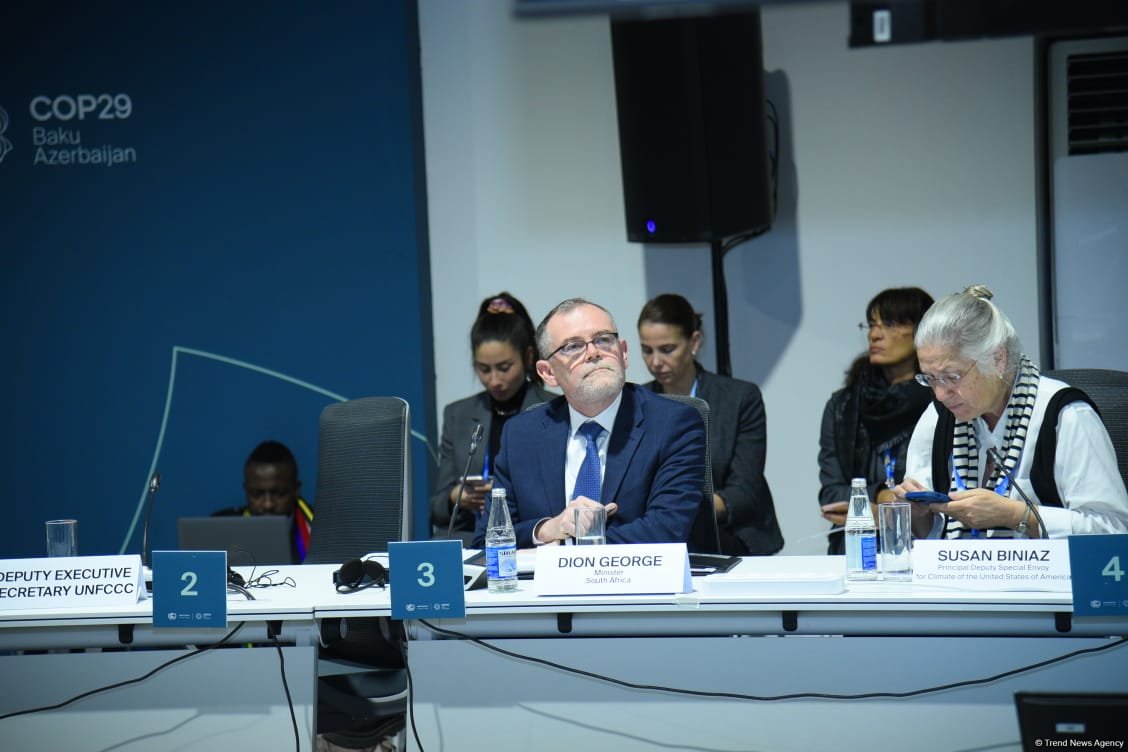BAKU, Azerbaijan, November 18. South Africa continues to actively work towards the Enhanced Transparency Framework (ETF) and its climate commitments, South African Minister of Environment, Forestry, and Fisheries Dion George said during the COP29 ministerial roundtable on global climate transparency today, Trend reports.
According to him, South Africa has submitted three national communications, five biennial transparency reports (BTR), and seven national inventory reports to the UN and IPCC.
The latest version of the report was submitted in 2023, and this year, the country plans to submit its fourth national communication and its first transparency report, George mentioned.
"South Africa actively tracks the progress of its Nationally Determined Contributions (NDC), with projected greenhouse gas emissions in 2025 ranging from 398 to 510 million tons of carbon dioxide equivalent and in 2030 from 350 to 420 million tons," he also said.
The minister emphasized that to achieve these goals, South Africa is implementing a number of important policies, including Integrated Energy and Resource Strategy Plans, as well as a strategy for transitioning to green energy.
As George explained, his country is also continuing to implement a carbon tax, a 'green' transport strategy, and waste recycling programs.
Moreover, the minister highlighted the importance of financial support for developing countries like South Africa in meeting their climate commitments.
He called on developed countries to provide financial assistance in the form of grants and concessional loans, as well as to facilitate technology transfer to help achieve the goals of the Paris Agreement and reach carbon neutrality by 2050.
To note, the 29th session of the Conference of the Parties to the UN Framework Convention on Climate Change (COP29), which will run until November 22, opened at the Baku Olympic Stadium on November 11. It is the largest event organized by Azerbaijan to date, and the first time in the region that it is being held in Azerbaijan.
Within COP29, the highest level event - the summit of world leaders on climate action - was held on November 12–13.
The main expectation from COP29 is to agree on a fair and ambitious New Collective Quantitative Goal (NCQG) on climate finance. The COP29 chairmanship has launched 14 initiatives that include linkages between climate action and the Sustainable Development Goals, including green energy corridors, green energy storage, harmony for climate resilience, clean hydrogen, methane reduction in organic waste, action on green digital technologies, and other topics.
In addition to being a top priority that creates the conditions for action, creating climate finance will also help fulfill the 1.5°C pledge by bringing everyone together.
The UN Framework Convention on Climate Change is an agreement signed at the Rio Earth Summit in June 1992 to prevent dangerous human interference in the climate system. The acronym COP (Conference of Parties) stands for “Conference of Parties” and is the highest legislative body overseeing the implementation of the Framework Convention on Climate Change.
A total of 198 countries are parties to the Convention. Unless otherwise decided by the parties, COP is held annually. The first COP event was held in March 1995 in Berlin, and its secretariat is located in Bonn.
Stay up-to-date with more news on Trend News Agency's WhatsApp channel







